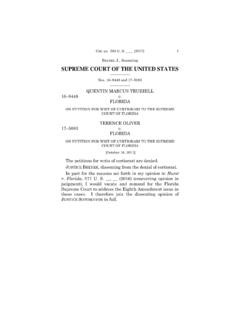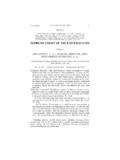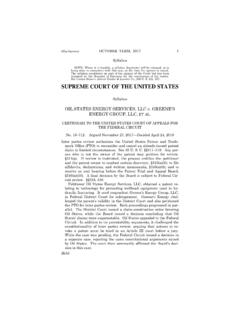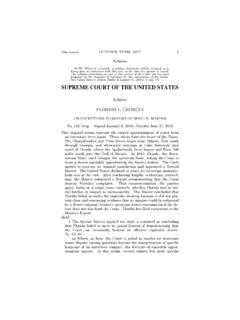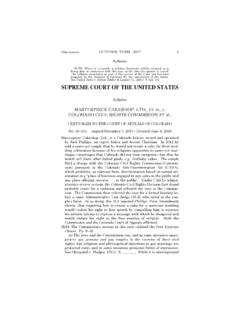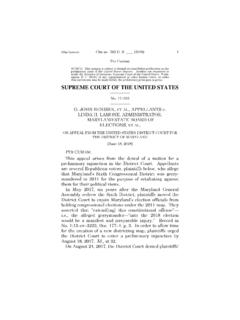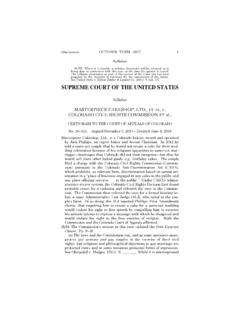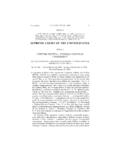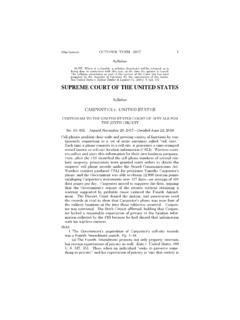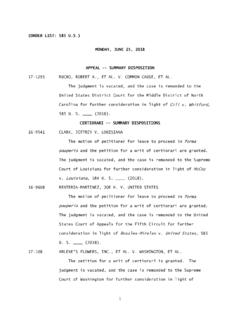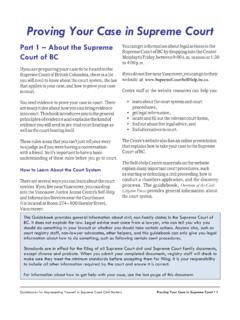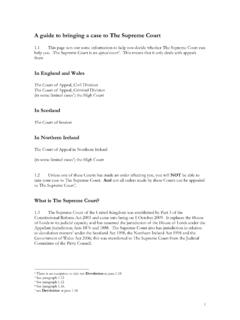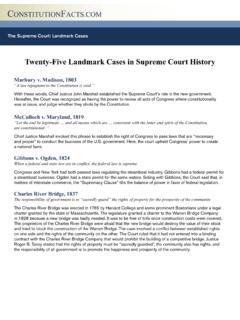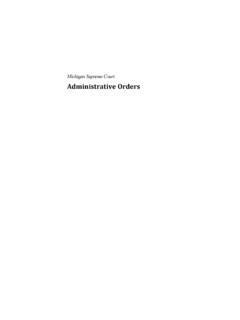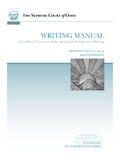Transcription of SUPREME COURT OF THE UNITED STATES
1 (Slip Opinion) OCTOBER TERM, 2015 1. Syllabus NOTE: Where it is feasible, a syllabus (headnote) will be released, as is being done in connection with this case, at the time the opinion is issued. The syllabus constitutes no part of the opinion of the COURT but has been prepared by the Reporter of Decisions for the convenience of the reader. See UNITED STATES v. Detroit Timber & Lumber Co., 200 U. S. 321, 337. SUPREME COURT OF THE UNITED STATES . Syllabus BIRCHFIELD v. NORTH DAKOTA. CERTIORARI TO THE SUPREME COURT OF NORTH DAKOTA. No. 14 1468. Argued April 20, 2016 Decided June 23, 2016*. To fight the serious harms inflicted by drunk drivers, all STATES have laws that prohibit motorists from driving with a blood alcohol concen- tration (BAC) exceeding a specified level. BAC is typically deter- mined through a direct analysis of a blood sample or by using a ma- chine to measure the amount of alcohol in a person's breath.
2 To help secure drivers' cooperation with such testing, the STATES have also enacted implied consent laws that require drivers to submit to BAC. tests. Originally, the penalty for refusing a test was suspension of the motorist's license. Over time, however, STATES have toughened their drunk-driving laws, imposing harsher penalties on recidivists and drivers with particularly high BAC levels. Because motorists who fear these increased punishments have strong incentives to re- ject testing, some STATES , including North Dakota and Minnesota, now make it a crime to refuse to undergo testing. In these cases, all three petitioners were arrested on drunk-driving charges. The state trooper who arrested petitioner Danny Birchfield advised him of his obligation under North Dakota law to undergo BAC testing and told him, as state law requires, that refusing to submit to a blood test could lead to criminal punishment. Birchfield refused to let his blood be drawn and was charged with a misde- meanor violation of the refusal statute.
3 He entered a conditional guilty plea but argued that the Fourth Amendment prohibited crimi- nalizing his refusal to submit to the test. The State District COURT re- . * Together with No. 14 1470, Bernard v. Minnesota, on certiorari to the SUPREME COURT of Minnesota, and No. 14 1507, Beylund v. Levi, Director, North Dakota Department of Transportation, also on certiorari to the SUPREME COURT of North Dakota. 2 BIRCHFIELD v. NORTH DAKOTA. Syllabus jected his argument, and the State SUPREME COURT affirmed. After arresting petitioner William Robert Bernard, Jr., Minnesota police transported him to the station. There, officers read him Min- nesota's implied consent advisory, which like North Dakota's informs motorists that it is a crime to refuse to submit to a BAC test. Ber- nard refused to take a breath test and was charged with test refusal in the first degree. The Minnesota District COURT dismissed the charges, concluding that the warrantless breath test was not permit- ted under the Fourth Amendment.
4 The State COURT of Appeals re- versed, and the State SUPREME COURT affirmed. The officer who arrested petitioner Steve Michael Beylund took him to a nearby hospital. The officer read him North Dakota's im- plied consent advisory, informing him that test refusal in these cir- cumstances is itself a crime. Beylund agreed to have his blood drawn. The test revealed a BAC level more than three times the le- gal limit. Beylund's license was suspended for two years after an administrative hearing, and on appeal, the State District COURT re- jected his argument that his consent to the blood test was coerced by the officer's warning. The State SUPREME COURT affirmed. Held: 1. The Fourth Amendment permits warrantless breath tests inci- dent to arrests for drunk driving but not warrantless blood tests. Pp. 13 36. (a) Taking a blood sample or administering a breath test is a search governed by the Fourth Amendment. See Skinner v.
5 Railway Labor Executives' Assn., 489 U. S. 602, 616 617; Schmerber v. Cali- fornia, 384 U. S. 757, 767 768. These searches may nevertheless be exempt from the warrant requirement if they fall within, as relevant here, the exception for searches conducted incident to a lawful arrest. This exception applies categorically, rather than on a case-by-case basis. Missouri v. McNeely, 569 U. S. ___, ___, n. 3. Pp. 14 16. (b) The search-incident-to-arrest doctrine has an ancient pedi- gree that predates the Nation's founding, and no historical evidence suggests that the Fourth Amendment altered the permissible bounds of arrestee searches. The mere fact of the lawful arrest justifies a full search of the person. UNITED STATES v. Robinson, 414 U. S. 218, 235. The doctrine may also apply in situations that could not have been envisioned when the Fourth Amendment was adopted. In Riley v. California, 573 U. S. ___, the COURT considered how to apply the doctrine to searches of an arrestee's cell phone.
6 Because founding era guidance was lacking, the COURT determined whether to exempt [the]. search from the warrant requirement by assessing, on the one hand, the degree to which it intrudes upon an individual's privacy and, on the other, the degree to which it is needed for the promotion of legit- Cite as: 579 U. S. ____ (2016) 3. Syllabus imate governmental interests.' Id., at ___. The same mode of anal- ysis is proper here because the founding era provides no definitive guidance on whether blood and breath tests should be allowed inci- dent to arrest. Pp. 16 20. (c) The analysis begins by considering the impact of breath and blood tests on individual privacy interests. Pp. 20 23. (1) Breath tests do not implicat[e] significant privacy con- cerns. Skinner, 489 U. S., at 626. The physical intrusion is almost negligible. The tests do not require piercing the skin and entail a minimum of inconvenience. Id., at 625. Requiring an arrestee to in- sert the machine's mouthpiece into his or her mouth and to exhale deep lung air is no more intrusive than collecting a DNA sample by rubbing a swab on the inside of a person's cheek, Maryland v.
7 King, 569 U. S. ___, ___, or scraping underneath a suspect's fingernails, Cupp v. Murphy, 412 U. S. 291. Breath tests, unlike DNA samples, also yield only a BAC reading and leave no biological sample in the government's possession. Finally, participation in a breath test is not likely to enhance the embarrassment inherent in any arrest. Pp. 20 . 22. (2) The same cannot be said about blood tests. They require piercing the skin and extract a part of the subject's body, Skinner, supra, at 625, and thus are significantly more intrusive than blowing into a tube. A blood test also gives law enforcement a sample that can be preserved and from which it is possible to extract information beyond a simple BAC reading. That prospect could cause anxiety for the person tested. Pp. 22 23. (d) The analysis next turns to the STATES ' asserted need to obtain BAC readings. Pp. 23 33. (1) The STATES and the Federal Government have a paramount interest.
8 In preserving [public highway] safety, Mackey v. Montrym, 443 U. S. 1, 17; and STATES have a compelling interest in creating deterrent[s] to drunken driving, a leading cause of traffic fatalities and injuries, id., at 18. Sanctions for refusing to take a BAC test were increased because consequences like license suspen- sion were no longer adequate to persuade the most dangerous offend- ers to agree to a test that could lead to severe criminal sanctions. By making it a crime to refuse to submit to a BAC test, the laws at issue provide an incentive to cooperate and thus serve a very important function. Pp. 23 25. (2) As for other ways to combat drunk driving, this COURT 's de- cisions establish that an arresting officer is not obligated to obtain a warrant before conducting a search incident to arrest simply because there might be adequate time in the particular circumstances to ob- tain a warrant. The legality of a search incident to arrest must be 4 BIRCHFIELD v.
9 NORTH DAKOTA. Syllabus judged on the basis of categorical rules. See , Robinson, supra, at 235. McNeely, supra, at ___, distinguished. Imposition of a warrant requirement for every BAC test would likely swamp courts, given the enormous number of drunk-driving arrests, with little corresponding benefit. And other alternatives , sobriety checkpoints and igni- tion interlock systems are poor substitutes. Pp. 25 30. (3) Bernard argues that warrantless BAC testing cannot be justified as a search incident to arrest because that doctrine aims to prevent the arrestee from destroying evidence, while the loss of blood alcohol evidence results from the body's metabolism of alcohol, a nat- ural process not controlled by the arrestee. In both instances, howev- er, the State is justifiably concerned that evidence may be lost. The State's general interest in evidence preservation or avoiding the loss of evidence, Riley, supra, at ___, readily encompasses the me- tabolization of alcohol in the blood.
10 Bernard's view finds no support in Chimel v. California, 395 U. S. 752, 763, Schmerber, 384 U. S., at 769, or McNeely, supra, at ___. Pp. 30 33. (e) Because the impact of breath tests on privacy is slight, and the need for BAC testing is great, the Fourth Amendment permits warrantless breath tests incident to arrests for drunk driving. Blood tests, however, are significantly more intrusive, and their reasona- bleness must be judged in light of the availability of the less invasive alternative of a breath test. Respondents have offered no satisfactory justification for demanding the more intrusive alternative without a warrant. In instances where blood tests might be preferable , where substances other than alcohol impair the driver's ability to op- erate a car safely, or where the subject is unconscious nothing pre- vents the police from seeking a warrant or from relying on the exi- gent circumstances exception if it applies.
